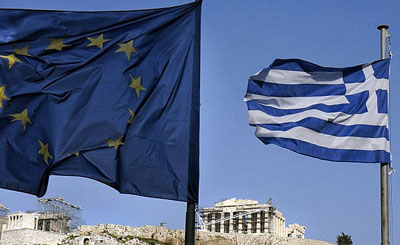Greece Economic Crisis Enters Year 9

Greece’s fledgling economy fell back into recession in the fourth quarter of 2015, as the combination of sky-high unemployment, weak inflation and a shaky financial sector ended a turbulent year defined by political crisis and uncertainty.
Gross domestic product (GDP) – the value of all goods and services produced in the economy – contracted 0.6% in the final three months of 2015 after shrinking 1.4% in the third quarter, revised data from the Hellenic Statistical Authority revealed last month. While the drop was more moderate than expected, it confirmed that Europe’s most troubled economy was back in the doldrums after a modest recovery in 2014.
Inflation also turned negative in 2015, as the impact of plunging oil prices and weak overall demand outweighed the increase in the value added tax (VAT) rate, which Greece signed on for as part of its €86 billion bailout deal with the European Commission, European Central Bank and International Monetary Fund.
According to the European Commission, Greek inflation averaged -1.1% in all of 2015, much worse than the euro area average. Deflationary pressures throughout he region have forced the European Central Bank to adopt unconventional policies over the past 12 months, including lowering interest rates to record lows, adopting negative deposit rates and expanding the size and scope of its monthly bond-buying program.
Greece’s economy is forecast to contract by 0.7% this year “amid the negative carryover from 2015 and the faltering domestic demand in the first half of the year,” the European Commission said in its winter outlook report.
However, the economy is expected to strengthen in the latter half of the year on improving confidence, the reduction of capital controls and greater compliance with the European Stability Mechanism (ESM) assistance program. Greece’s tourism industry, which accounts for 18% of national GDP and employs more than 900,000 people, continues to perform exceptionally well. Business confidence and economic sentiment across key sectors are also expected to stabilize and improve.
Growth in the neighbouring euro area will remain moribund for the foreseeable future. The euro area economy is projected to grow around 1.7% in 2016, according to the IMF.
Long-term, Greece requires both “symbolic and real measures” to support the recovery and ensure government ownership of the latest bailout reforms, according to Tassos Anastasatos, an economist at Eurobank Ergasias in Athens.
“We expect weakness of domestic demand in the entire of 2016, and it remains to be seen to what extent that can be counterbalanced by exports and investments,” Anastasatos said in a quote provided by Bloomberg News.
While Athens’ eleventh hour bailout deal last July may have averted a bigger political crisis, analysts warn that the country will face continued euro-exit fears unless policymakers can come up with a way to make its debt more sustainable. Greece’s debt mountain reached €320 billion in 2015, and that was before the latest bailout plan.
Greece’s road to recovery will be a long and painful one. About a quarter of the country’s workforce is unemployed, with gross public debt expected to reach 185% of GDP this year. The country has contracted in seven of the past eight years, according to data provided by the World Bank. Private consumption has plunged by about 30% since 2010, with food consumption down a staggering 28%. Since the 2009 financial crisis, Greece has experienced one of the biggest drops in real wages across the advanced industrialized world.
Investors monitoring Greece’s recovery should take note of retail sales and PMI data in the coming week, which could shed light on the country’s economic activity in the first quarter of 2016.
Greece’s manufacturing sector contracted in February, PMI data from Markit Economics revealed earlier this month. It marked the first state of contraction in three months.
Markit’s Greece manufacturing PMI fell to 48.4 in February from 50 the previous month on a scale where a reading below 50 suggests contraction in the sector.
“The key areas covered by the survey provided alarming indicators on the current health of the Greek manufacturing sector,” Samuel Agass, economist at Markit, said in a statement dated March 1. “Output contracted further amid a solid decline in incoming new work, while job cuts were evident after another substantial deterioration in outstanding business levels was reported.”
He added, “Coupling PMI data with latest GDP figures also paints a gloomy image of the current state of the economy. The 0.6% contraction for the fourth quarter of 2015 was the worst amongst eurozone members and added to the growing uncertainty around Greece’s future. With proposed pension and tax reforms already creating economic headwinds, the prospect of moving out of this technical recession appears distant at present.”
Source: EconomicCalendar.com – Greece Economic Crisis Enters Year 9




























